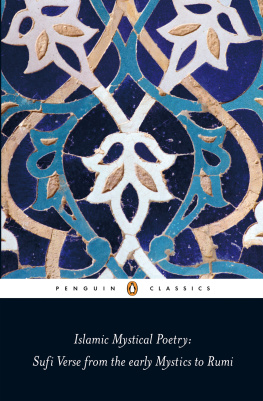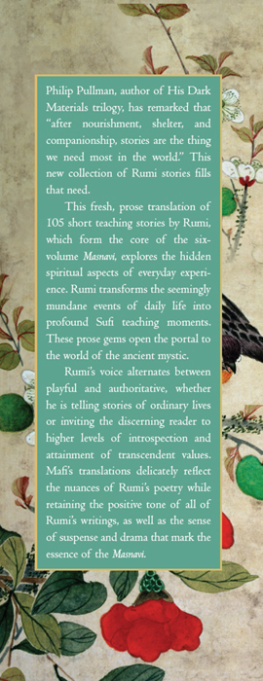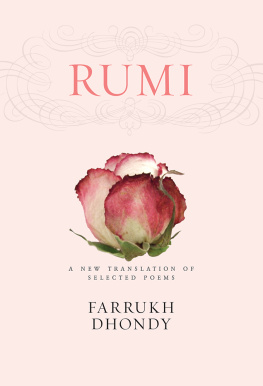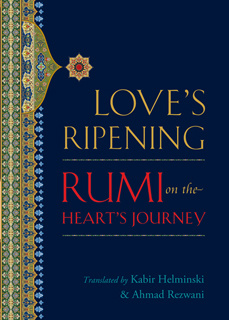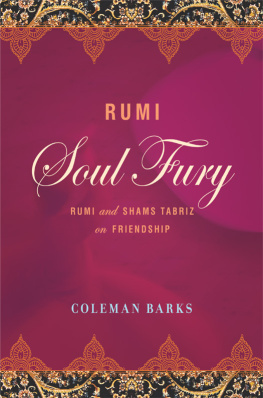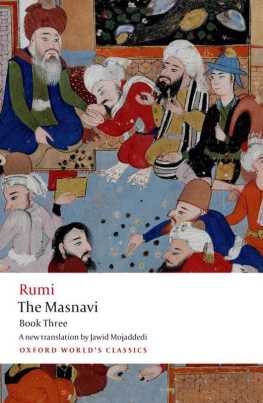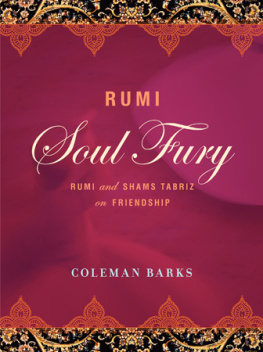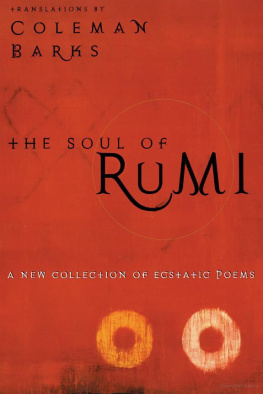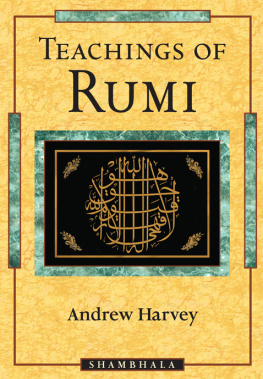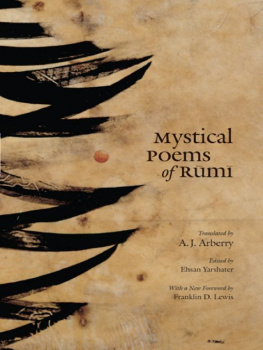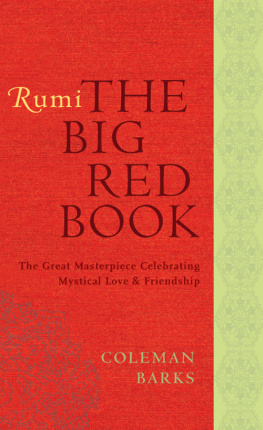Rumi - Islamic Mystical Poetry
Here you can read online Rumi - Islamic Mystical Poetry full text of the book (entire story) in english for free. Download pdf and epub, get meaning, cover and reviews about this ebook. year: 2010, publisher: Penguin Group USA, Inc., genre: Religion. Description of the work, (preface) as well as reviews are available. Best literature library LitArk.com created for fans of good reading and offers a wide selection of genres:
Romance novel
Science fiction
Adventure
Detective
Science
History
Home and family
Prose
Art
Politics
Computer
Non-fiction
Religion
Business
Children
Humor
Choose a favorite category and find really read worthwhile books. Enjoy immersion in the world of imagination, feel the emotions of the characters or learn something new for yourself, make an fascinating discovery.
Islamic Mystical Poetry: summary, description and annotation
We offer to read an annotation, description, summary or preface (depends on what the author of the book "Islamic Mystical Poetry" wrote himself). If you haven't found the necessary information about the book — write in the comments, we will try to find it.
Rumi: author's other books
Who wrote Islamic Mystical Poetry? Find out the surname, the name of the author of the book and a list of all author's works by series.
Islamic Mystical Poetry — read online for free the complete book (whole text) full work
Below is the text of the book, divided by pages. System saving the place of the last page read, allows you to conveniently read the book "Islamic Mystical Poetry" online for free, without having to search again every time where you left off. Put a bookmark, and you can go to the page where you finished reading at any time.
Font size:
Interval:
Bookmark:
MAHMOOD JAMAL
Ahmad Abdul Bari (Bari Mian)
without whose example and help
this book would not have been possible
and to my parents
for inculcating the spirit of poetry in me PENGUIN CLASSICS Published by the Penguin Group Penguin Books Ltd, 80 Strand, London WC2R 0RL , England Penguin Group (USA) Inc., 375 Hudson Street, New York, New York 10014, USA Penguin Group (Canada), 90 Eglinton Avenue East, Suite 700, Toronto, Ontario,
Canada M4P 2Y3 (a division of Pearson Penguin Canada Inc.) Penguin Ireland, 25 St Stephens Green, Dublin 2, Ireland (a division of Penguin Books Ltd) Penguin Group (Australia), 250 Camberwell Road, Camberwell, Victoria 3124, Australia
(a division of Pearson Australia Group Pty Ltd) Penguin Books India Pvt Ltd, 11 Community Centre, Panchsheel Park, New Delhi 110 017, India Penguin Group (NZ), 67 Apollo Drive, Rosedale, North Shore 0632, New Zealand
(a division of Pearson New Zealand Ltd) Penguin Books (South Africa) (Pty) Ltd, 24 Sturdee Avenue, Rosebank, Johannesburg 2196,
South Africa Penguin Books Ltd, Registered Offices: 80 Strand, London WC2R 0RL , England www.penguin.com First published in Penguin Classics 2009 Selection and introduction copyright Mahmood Jamal, 2009 Translations copyright Mahmood Jamal, 2009, unless otherwise specified on pp. All rights reserved The Copyright Acknowledgements on pages constitute an extension of this copyright page The moral right of the translators and editor has been asserted Except in the United States of America, this book is sold subject to the condition that it shall not, by way of trade or otherwise, be lent, re-sold, hired out, or otherwise circulated without the publishers prior consent in any form of binding or cover other than that in which it is published and without a similar condition including this condition being imposed on the subsequent purchaser ISBN: 9781101488348

Jamal works as an independent producer and writer, and has produced several documentaries, notably a series called Islamic Conversations. He was also a lead writer on Family Pride, Britains first Asian soap, and he wrote and produced the groundbreaking television drama Turning World for Channel 4. He has a degree in South Asian Studies from the School of Oriental and African Studies, University of London.
My heart has become capable of every form: it is a pasture for gazelles and a convent for Christian monks, And a temple for idols and the pilgrims and the tables of the Torah and the book of the Quran. I follow the religion of Love: whatever way Loves camels take, that is my religion and my faith. Mohyuddin Ibn ArabiForemost among whom is my illustrious ancestor Sheikh Abdullah Ansari of Herat, whose spirit guided me through the writing of this book. I especially wish to celebrate the inspiration that I received from my grandfather Maulana Abdul Bari and my maternal grandfather Shah Hayat Ahmad of Dargah Sharif, Rudauli, and my father Maulana Jamal Mian, whose spiritual intensity, humanism and oceanic knowledge and love of poetry greatly influenced me, and I shall forever lament that I was not able to sit at his feet more often than I did. This is also the moment to thank my cousin Maulana Matin Mian of Firangi Mahal, who epitomizes the enlightened spirit of my ancestors for me. I would also like to acknowledge a deep debt to my brother Ahmad Abdul Bari or Bari Mian, whose help, support and advice with the translations made this book possible. I must also mention my sisters Farida, for her relentless support, and Amina, who helped me with the editing, as well as my niece Mariam Khan for her diligent biographical research; also Reza Ale Mohammad, who assisted with some of the translations of Sanai Ghaznavi. I am indebted to the distinguished scholars without whose pioneering work my book would not have been possible.
Foremost among these renowned personalities are Professor E. G. Browne, Professor E. J. W. H. H.
Whinfield and, last but not least, R. A. Nicholson, from whose monumental achievements I have had the good fortune to benefit. I would also like to thank Professor Francis Robinson, who, though not directly involved in this work, has been the spark that lit the flame of discovery in me to look into my own history and inheritance and shed light on many things I was unaware of about myself and my ancestors. Mention must also be made of Murli, that great singer whose magic cast its spell on me and infused my being with joy and whose renderings of Hafiz and Rumi are my constant companions.
My first introduction to Sufi poetry or Islamic mystical poetry was not through books but through the medium of qawwali, a kind of musical composition in which the verses, not the music, are paramount. At qawwali performances (or Mehfil-e-Sama), which regularly occur at both private homes and at the shrines of famous saints in South Asia, one can hear to this day the words of Hafiz and Sadi Shirazi (11841291), Jalaluddin Rumi (120773) and Amir Khusrow Dehlavi (12531325), as well as the vernacular of Kabir (13981447), Sultan Bahu (c. 162891) and Baba Bulleh Shah (16801757), some of the most popular and revered Sufi poets of Islam. For it is in the poetry of the Muslim world that the soul and heart of Islamic civilization lie. While this is a book of Islamic mystical or Sufi poetry, and not about Islamic mysticism or Sufism (I will use these terms interchangeably), a better appreciation of the verses requires some understanding of Sufi ideas.
What defined the early Sufis was their absorption with God, other-worldliness and a life removed, and these concerns were reflected in their sayings and poetic output. These early Sufis were mystics and philosophers first and poets second. Their greatness, in other words, lies not in their poetry but in their lives and their utterances. Among the early mystics were Rabia Basri (d. 801), Junaid Baghdadi (830 910), Hasan Basri (642728/737) and Shibli Baghdadi (d. 922). 922).
He is considered the earliest martyr of Islam, executed for his famous utterance
Font size:
Interval:
Bookmark:
Similar books «Islamic Mystical Poetry»
Look at similar books to Islamic Mystical Poetry. We have selected literature similar in name and meaning in the hope of providing readers with more options to find new, interesting, not yet read works.
Discussion, reviews of the book Islamic Mystical Poetry and just readers' own opinions. Leave your comments, write what you think about the work, its meaning or the main characters. Specify what exactly you liked and what you didn't like, and why you think so.

